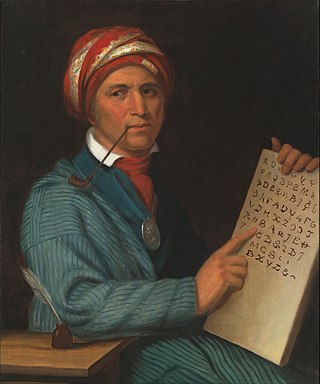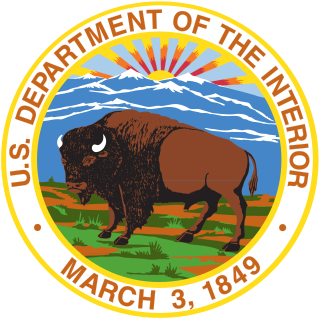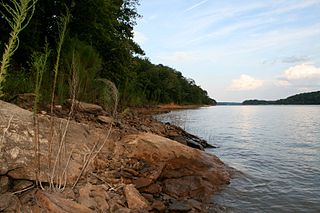Related Research Articles

The Cherokee people are one of the Indigenous peoples of the Southeastern Woodlands of the United States. Prior to the 18th century, they were concentrated in their homelands, in towns along river valleys of what is now southwestern North Carolina, southeastern Tennessee, southwestern Virginia, edges of western South Carolina, northern Georgia and northeastern Alabama consisting of around 40,000 square miles.

The Muscogee, also known as the Mvskoke, Muscogee Creek or just Creek, and the Muscogee Creek Confederacy, are a group of related Indigenous peoples of the Southeastern Woodlands in the United States. Their historical homelands are in what now comprises southern Tennessee, much of Alabama, western Georgia and parts of northern Florida.

The United States Department of the Interior (DOI) is an executive department of the U.S. federal government responsible for the management and conservation of most federal lands and natural resources. It also administers programs relating to Native Americans, Alaska Natives, Native Hawaiians, territorial affairs, and insular areas of the United States, as well as programs related to historic preservation. About 75% of federal public land is managed by the department, with most of the remainder managed by the Department of Agriculture's Forest Service. The department was created on March 3, 1849. It is headquartered at the Main Interior Building, located at 1849 C Street NW in Washington, D.C.

Lauderdale County is a county located in the northwestern corner of the U.S. state of Alabama. At the 2020 census the population was 93,564. Its county seat is Florence. Its name is in honor of Colonel James Lauderdale, of Tennessee. Lauderdale is part of the Florence-Muscle Shoals, AL Metropolitan Statistical Area, also known as "The Shoals".

Tipton County is a county located on the western end of the U.S. state of Tennessee, in the Mississippi Delta region. As of the 2020 census, the population was 60,970. Its county seat is Covington. Tipton County, founded in 1823, is part of the Memphis, TN-MS-AR Metropolitan Statistical Area.

Lawrence County is a county located in the U.S. state of Tennessee. As of the 2020 census, the population was 44,159. Its county seat and largest city is Lawrenceburg. Lawrence County comprises the Lawrenceburg, TN Micropolitan Statistical Area, which is also included in the Nashville-Davidson-Murfreesboro, TN Combined Statistical Area.

The Chickasaw are an Indigenous people of the Southeastern Woodlands, United States. Their traditional territory was in northern Mississippi, northwestern and northern Alabama, western Tennessee and southwestern Kentucky. Their language is classified as a member of the Muskogean language family. In the present day, they are organized as the federally recognized Chickasaw Nation.

Henning is a town in Lauderdale County, Tennessee, United States. The population was 945 at the 2010 census.
Midtown is a census-designated place (CDP) in Roane County, Tennessee, United States. Its population was 1,360 as of the 2010 census. Twice in the 1990s residents voted to incorporate as a town, and for a time the community maintained a municipal government, but the incorporation was challenged in court and eventually overturned after the state statute under which Midtown incorporated was ruled unconstitutional. It was a city at the time of the 2000 census, when the population was 1,306. It is included in the Knoxville Metropolitan Area.

The Bureau of Indian Affairs (BIA), also known as Indian Affairs (IA), is a United States federal agency within the Department of the Interior. It is responsible for implementing federal laws and policies related to Native Americans and Alaska Natives, and administering and managing over 55,700,000 acres (225,000 km2) of reservations held in trust by the U.S. federal government for indigenous tribes. It renders services to roughly 2 million indigenous Americans across 574 federally recognized tribes. The BIA is governed by a director and overseen by the Assistant Secretary for Indian Affairs, who answers to the Secretary of the Interior.

An American Indian reservation is an area of land held and governed by a U.S. federal government-recognized Native American tribal nation, whose government is autonomous, subject to regulations passed by the United States Congress and administered by the United States Bureau of Indian Affairs, and not to the U.S. state government in which it is located. Some of the country's 574 federally recognized tribes govern more than one of the 326 Indian reservations in the United States, while some share reservations, and others have no reservation at all. Historical piecemeal land allocations under the Dawes Act facilitated sales to non–Native Americans, resulting in some reservations becoming severely fragmented, with pieces of tribal and privately held land being treated as separate enclaves. This intersection of private and public real estate creates significant administrative, political, and legal difficulties.

The Senate Committee on Indian Affairs is a committee of the United States Senate charged with oversight in matters related to the American Indian, Native Hawaiian, and Alaska Native peoples. A Committee on Indian Affairs existed from 1820 to 1947, after which it was folded into the Committee on Interior and Insular Affairs. A new Native Affairs Committee was created in 1977, initially as a select committee, as a result of the detachment of indigenous affairs from the new Committee on Energy and National Resources, which had succeeded the old Committee on Interior and Insular Affairs. The committee was initially intended to be temporary, but was made permanent in 1984. The committee tends to include senators from Western and Plains states, who have more Native American constituents.

The Yuchi people are a Native American tribe based in Oklahoma, though their original homeland was in the southeastern United States.
State-recognized tribes in the United States are organizations that identify as Native American tribes or heritage groups that do not meet the criteria for federally recognized Indian tribes but have been recognized by a process established under assorted state government laws for varying purposes or by governor's executive orders. State recognition does not dictate whether or not they are recognized as Native American tribes by continually existing tribal nations.
Native American Day is a holiday observed in several US states in celebration of Native American culture. In California and Nevada, the holiday is designated on the fourth Friday of September, whereas in South Dakota and Wisconsin, it falls on the second Monday of October. Within each of these states, Native American Day honors the cultural contributions of Native American communities to the respective state's history, as well as to the overall country. The state of Washington celebrates Native American Heritage Day on the Friday immediately following the fourth Thursday in November. The state of Tennessee observes a similar American Indian Day each year on the fourth Monday of September. President George W. Bush signed into law legislation introduced by Congressman Joe Baca (D-Calif.), to designate the Friday after Thanksgiving as Native American Heritage Day.

Nikwasi comes from the Cherokee word for "star", Ꮓꮘꮟ Noquisi (No-kwee-shee), and is the site of the Cherokee town which is first found in colonial records in the early 18th century, but is much older. The town covered about 100 acres (40 ha) on the floodplain of the Little Tennessee River. Franklin, North Carolina, was later developed by European Americans around this site.

Tugaloo was a Cherokee town located on the Tugaloo River, at the mouth of Toccoa Creek. It was south of Toccoa and Travelers Rest State Historic Site in present-day Stephens County, Georgia, United States. Cultures of ancient indigenous peoples had occupied this area, and those of the South Appalachian Mississippian culture built a platform mound and village here. It was an administrative and ceremonial center for them.
Title 25 of the United States Code outlines the role of Indians in the United States Code.

The Pinoleville Pomo Nation is a federally recognized tribe of Pomo people in Mendocino County, California. Leona Williams serves as Tribal Chairperson.
References
- ↑ "The Origin of the Tennessee Commission of Indian Affairs". Native American Indian Association of Tennessee. Retrieved February 4, 2016.